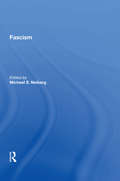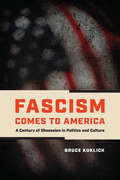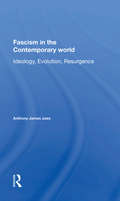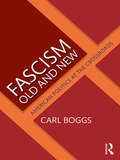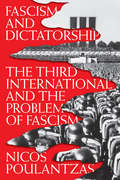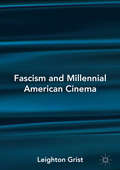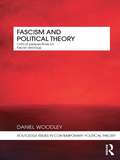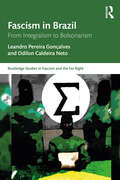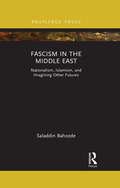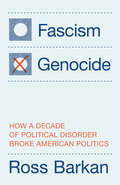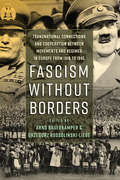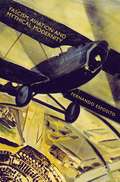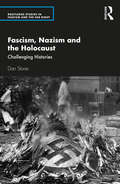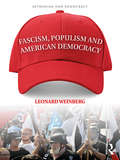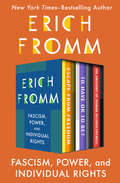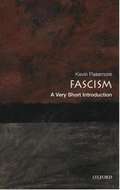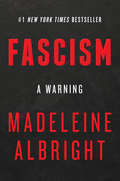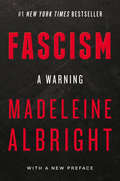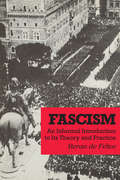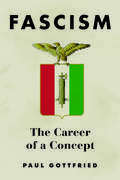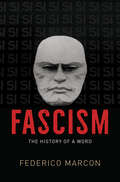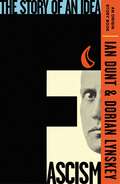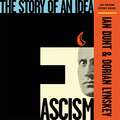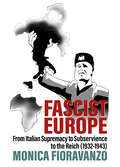- Table View
- List View
Fascism (The\international Library Of Essays On Political History)
by Michael S. NeibergThis volume presents the best writings on the origins, development, success and failure of fascism outside Germany. By treating the problem in a global context, these essays together add tremendous complexity to our understanding of one of history‘s most destructive political movements. The collection covers theories, origins and definitions of fascism, fascism in power, fascism in opposition, and fascism in a global and comparative setting.
Fascism Comes to America: A Century of Obsession in Politics and Culture
by Bruce KuklickA deeply relevant look at what fascism means to Americans. From the time Mussolini took power in Italy in 1922, Americans have been obsessed with and brooded over the meaning of fascism and how it might migrate to the United States. Fascism Comes to America examines how we have viewed fascism overseas and its implications for our own country. Bruce Kuklick explores the rhetoric of politicians, who have used the language of fascism to smear opponents, and he looks at the discussions of pundits, the analyses of academics, and the displays of fascism in popular culture, including fiction, radio, TV, theater, and film. Kuklick argues that fascism has little informational meaning in the United States, but instead, it is used to denigrate or insult. For example, every political position has been besmirched as fascist. As a result, the term does not describe a phenomenon so much as it denounces what one does not like. Finally, in displaying fascism for most Americans, entertainment—and most importantly film—has been crucial in conveying to citizens what fascism is about. Fascism Comes to America has been enhanced by many illustrations that exhibit how fascism was absorbed into the US public consciousness.
Fascism In The Contemporary World: Ideology, Evolution, Resurgence
by Anthony J JoesCentral to this book is the assertion that fascist regimes similar in ideology and style to Mussolini's in Italy have arisen and will continue to arise in the underdeveloped world. The author views fascism as a definite response—authoritarian corporatist nationalism—to certain problems common to late-developing nations, not as an aberration that ca
Fascism Old and New: American Politics at the Crossroads
by Carl BoggsDeep historical trends suggest the United States could be moving toward a distinctly novel form of fascism, embracing elements of the historical phenomenon as it appeared in such countries as Italy, Germany, Japan, and Spain while departing in significant ways. A twenty-first century fascism would hardly be revolutionary or totalitarian, as it would involve no dramatic break with the past, following a logic of continuity and building on firmaments of entrenched power going back to World War II. This new type of fascist regime would be driven by a tightening confluence of sectoral interests in American society: corporate, state, military, and cultural – interests favoring oligarchy, authoritarianism, the warfare system, and surveillance order within an expanding globalized matrix of power. The dominant historical forces emphasized by such theorists as C. Wright Mills (The Power Elite) and Sheldon Wolin (Democracy, Inc.), an important foundation of this book, have grown stronger and more pervasive across the decades. An integrated power structure has been fueled by new advances in technology, a money-saturated political system, and neoliberal globalism bolstered by the spread of right wing populism that, among other things, has catapulted Donald Trump into the U.S. presidency. In this book, Carl Boggs explores new political and ideological terrain in systematically considering the prospects for a gradual development of fascism in contemporary American society and, by extension, elsewhere across the advanced industrial world. He persuasively argues that modern fascistic trends, arguably most visible in the U.S., demonstrate a closer affinity with Mussolini’s Italy (corporate state) than with the more extreme Nazi German model of tyranny and genocide. A very timely scholarly enterprise, this book will be of interest to students of contemporary radical politics, fascism more broadly, US political history, ideologies and party politics.
Fascism and Dictatorship: The Third International and the Problem of Fascism
by Nicos PoulantzasPoulantzas’s book is the first major Marxist study of German and Italian fascism to appear since the Second World War. It carefully distinguishes between fascism as a mass movement before the seizure of power and fascism as an entrenched machinery of dictatorship. It compares the distinct class components of the counter-revolutionary blocs mobilzed by fascism in Germany and Italy; analyses the changing relations between the petty bourgeoisie and big capital in the evolution of fascism; discusses the structures of the fascist state itself, as an emergency regime for the defense of capital; and provides a sustained and documented criticism of official Comintern attitudes and policies towards fascism in the fateful years after the Versailles settlement. Fascism and Dictatorship represents a challenging synthesis of factual evidence and conceptual analysis that has been rare in Marxist political theory to date.
Fascism and Millennial American Cinema
by Leighton GristThis book examines a spate of American films released around the turn of the millennium that differently address the actuality or possibility of domestic fascism within the USA. The films discussed span a diversity of forms, genres and production practices, and encompass low- and medium-budget studio and independent releases (such as American History X, Stir of Echoes and The Believer), star and/or auteur vehicles (such as The Siege, Fight Club and American Beauty), and high-budget, high-concept science-fiction films and franchises (such as Starship Troopers, Minority Report, the Matrix and X-Men trilogies and the Star Wars prequels). Central to the book is the detailed analysis of the films, which is contextualized historically in relation to a period that saw the significant rise of the far Right. The book concordantly affords a wider insight into fascism and its various manifestations and how such have been, and continue to be, registered within American cinema.
Fascism and Political Theory: Critical Perspectives on Fascist Ideology (Routledge Issues in Contemporary Political Theory)
by Daniel WoodleyFascism and Political Theory offers both students and researchers a thematic analysis of fascism, focusing on the structural and ideological links between fascism, capitalism and modernity. Intended as a critical discussion of the origins and development of fascist ideology, each chapter deals with a core substantive issue in political theory relevant to the study of fascism and totalitarianism, beginning with an assessment of the current state of debate. The emphasis on formal ideology in contemporary Anglo-American historiography has increased our awareness of the complexity and eclectic nature of fascist ideologies which challenge liberalism and social democracy. Yet in too many recent works, a programmatic or essentialist reading of fascist ideology as a ‘secular religion’ is taken for granted, while researchers remain preoccupied with the search for an elusive ‘fascist minimum’. In this book Woodley emphasizes that many outstanding questions remain, including the structural and ideological links between fascism and capitalism, the social construction of fascist nationalism, and the origins of fascist violence in European colonialism. This volume consolidates the reader’s theoretical understanding and provides the interdisciplinary skills necessary to understand the concrete social, economic and political conditions which generate and sustain fascism. A timely critique of culturalist and revisionist approaches in fascism studies which provides a concise overview of theoretical debates between liberalism, Marxism and poststructuralism, this text will be of great interest to students of politics, modern history and sociology.
Fascism in Brazil: From Integralism to Bolsonarism (Routledge Studies in Fascism and the Far Right)
by Leandro Pereira Gonçalves Odilon Caldeira NetoFascism in Brazil analyzes the long and varied history of the Brazilian extreme right. The book examines integralism, the main historical Brazilian fascist ideology represented by Brazilian integralist Action, the largest fascist movement outside Europe. It analyzes the Integralist tradition from its founding in 1932 to the present day. It examines how Brazilian integralist Action began with its leader Plínio Salgado's trip to Fascist Italy, and how the Popular Representation Party developed integralism in the postwar era. The book also explores the support of integralists for the 1964 military coup and the role of integralists in the dictatorship. The contemporary extreme right in Brazil is still inspired by the integralist slogans of the 1930s as they seek to find political space and to demonstrate their strength. Contemporary turning points in neo-integralism were the involvement of neo-fascist groups, including neo-integralists, in the upheavals that culminated in the election of Brazilian President Jair Bolsonaro, as well as in the attack on the headquarters of comedy group Porta dos Fundos in Rio de Janeiro in 2019. This book will be of interest to students and scholars researching comparative fascist studies, the history of the far right, and Brazilian and Latin American history and politics.
Fascism in the Middle East: Nationalism, Islamism, and Imagining Other Futures (Routledge Focus on Modern Subjects)
by Saladdin BahozdeFollowing decades of brutal campaigns against left forces, fascism in its nationalist and religious forms has been dominating Turkish, Iranian, and Arab politics for over half a century. At first, with key enemies vanquished, military generals assumed power and established some of the most terroristic totalitarian regimes in the 20th Century. It only followed that Islamist organizations then hijacked democratic movements of dissent. Now, in countries and territories where they have assumed state power, Islamist forces have surpassed all nationalist dictatorships for their utter disrespect of human lives.Today, Islamism subordinates peoples in the Middle East. Bearing the urgency of our times, Saladdin Bahozde problematizes all forms of fascist exclusionism in the region, while drawing attention to anti-fascist resistance and progressive alternatives there. As a critique of identitarianism and right-wing politics in the Middle East and North Africa, the work calls for a global movement, as endorsed by the peoples of the region, to go beyond nationalism and Islamism.
Fascism or Genocide: How a Decade of Political Disorder Broke American Politics
by Ross BarkanA deeply reported look at how polarization and compounding crises, including the war in Gaza and threats to democracy, have reshaped American politicsFascism or Genocide is New York Times Magazine writer Ross Barkan&’s sweeping report on the 2024 US election and the decade of political upheaval leading up to it.As in 2020, Joe Biden campaigned on a platform to save democracy, but fewer voters were persuaded this time. During the Democratic primary season, more than half a million Americans cast votes for &“Uncommitted&” ballot options to send Biden a message about the urgent need to end the killing in Gaza, with some tagging him &“Genocide Joe.&”In contrast, mainstream liberals backed the Democratic ticket in the belief that Trump would put America on the road to fascism. As the director of an influential Palestinian advocacy group tells Barkan, &“It&’s a choice between fascism or genocide.&”Biden&’s withdrawal from the election and Kamala Harris&’s subsequent nomination barely changed the narrative. Millions of Democrats stayed home after souring on the party, while others switched allegiance and got behind the Trump team. Fascism or Genocide takes a hard, informed look at the election, focusing on the future of the Democratic Party, the influence and potential of the progressive &“Squad,&” and ongoing culture wars within the party.
Fascism without Borders: Transnational Connections and Cooperation between Movements and Regimes in Europe from 1918 to 1945
by Arnd Bauerkämper Grzegorz Rossolinski-LiebeIt is one of the great ironies of the history of fascism that, despite their fascination with ultra-nationalism, its adherents understood themselves as members of a transnational political movement. While a true "Fascist International" has never been established, European fascists shared common goals and sentiments as well as similar worldviews. They also drew on each other for support and motivation, even though relations among them were not free from misunderstandings and conflicts. Through a series of fascinating case studies, this expansive collection examines fascism's transnational dimension, from the movements inspired by the early example of Fascist Italy to the international antifascist organizations that emerged in subsequent years.
Fascism, Aviation and Mythical Modernity
by Fernando EspositoFlying and the pilot were significant metaphors of fascism's mythical modernity. Fernando Esposito traces the changing meanings of these highly charged symbols from the air show in Brescia, to the sky above the trenches of the First World War to the violent ideological clashes of the interwar period.
Fascism, Nazism and the Holocaust: Challenging Histories (Routledge Studies in Fascism and the Far Right)
by Dan StoneThis book contains essays on Fascism, Nazism and the Holocaust by distinguished scholar Professor Dan Stone. It examines issues such as race science and the racial state, Nazi race ideology, slave labour, concentration camps, British reaction to the rise of Nazism and the Holocaust, the search for missing persons in the chaos of postwar Europe and the postwar revival of fascism. Though mainly focused on Nazi Germany, it also makes comparisons with other fascist movements and regimes in Romania and elsewhere. This book will be of great interest to scholars and students of antisemitism, fascism, Nazism, World War II, genocide studies and the Holocaust.
Fascism, Populism and American Democracy (Extremism and Democracy)
by Leonard WeinbergHard right-wing politics is growing in popularity in America, marked by Donald Trump’s success in the 2016 election, and it is worth questioning what this means for the American democratic system. This book seeks to explain the vulnerability of democracies to the appeal of right-wing politics through a contemporary case study of the US, and how democracies are possibly under threat from a conflict between popular attitudes and institutional paralysis. Various forms of American right-wing extremism are examined here, such as the alt-right, the radical right and the Religious right, but their perceived relevance to Trump’s victory is questioned. Even still, this book asks the question: can the far-right prevail under the American way?
Fascism, Power, and Individual Rights: Escape from Freedom, To Have or To Be?, and The Anatomy of Human Destructiveness
by Erich FrommThree fascinating examinations of the psychology of political power from the New York Times–bestselling author of The Art of Loving. Philosopher and social theorist Erich Fromm is renowned as “a psychologist of penetration and a writer of ability” (Chicago Tribune). In these three riveting works, Fromm sheds light on some of the most critical dilemmas facing humanity. Escape from Freedom: Though freedom has been a prized value in Western culture for centuries, it is often accompanied by feelings of anxiety and powerlessness. Fromm’s compelling study demonstrates how these feelings of alienation can lead to a desire for conformity and authoritarianism, bringing invaluable insight into the rise of Nazism and fascism in Europe. To Have or To Be?: Life in the modern age began when people no longer lived at the mercy of nature and instead took control of it. Fromm argues that through the process of modern materialism, the natural tendency of humankind moved away from practicing human abilities, and instead focused on possessing objects. Humankind therefore began using tools that replace our own powers to think, feel, and act independently. Fromm argues that positive change—both social and economic—will come from being, loving, and sharing. The Anatomy of Human Destructiveness: This classic study makes a distinction between animal aggression and certain forms of destructiveness that can only be found in human beings. His case studies span zoo animals, necrophiliacs, and the psychobiographies of notorious figures such as Hitler and Stalin, offering a comprehensive exploration of the human impulse for violence. This ebook features an illustrated biography of Erich Fromm including rare images and never-before-seen documents from the author’s estate.
Fascism: A Very Short Introduction
by Kevin PassmoreWhat is fascism? Is it revolutionary? Or is it reactionary? This book argues that it is both: fascism unleashes violence against the left and ethnic minorities, but also condemns the bourgeoisie for its 'softness'. Kevin Passmore opens his book with a series of 'scenes from fascist life' - a secret meeting of the Romanian Iron Guard; Mussolini meeting the king of Italy; a rally of Hungarian doctors calling for restrictions on the number of Jews entering the profession; the shooting of 1800 Jews by Reserve Police Battalion 101 at Jozefow in Poland in July 1942. He then looks at the paradoxes of fascism through its origins in the political and social crisis of the late nineteenth century, the history of fascist movements and regimes in Italy and Germany, and the fortunes of 'failed' fascist movements in Romania, Hungary and Spain. He shows how fascism used and uses propaganda and popular culture to propagate itself and how it exported its ideas outside Europe, through Nazi and Spanish post-war escape routes to Latin America, for instance. The book concludes with a discussion of the recent revival of the extreme right in Austria, Italy, France, and Russia.
Fascism: A Warning
by Madeleine Albright<P>A personal and urgent examination of Fascism in the twentieth century and how its legacy shapes today’s world, written by one of America’s most admired public servants, the first woman to serve as U.S. secretary of stateA Fascist, observes Madeleine Albright, “is someone who claims to speak for a whole nation or group, is utterly unconcerned with the rights of others, and is willing to use violence and whatever other means are necessary to achieve the goals he or she might have.” <P>The twentieth century was defined by the clash between democracy and Fascism, a struggle that created uncertainty about the survival of human freedom and left millions dead. Given the horrors of that experience, one might expect the world to reject the spiritual successors to Hitler and Mussolini should they arise in our era. <P>In Fascism: A Warning, Madeleine Albright draws on her experiences as a child in war-torn Europe and her distinguished career as a diplomat to question that assumption.Fascism, as she shows, not only endured through the twentieth century but now presents a more virulent threat to peace and justice than at any time since the end of World War II. <P>The momentum toward democracy that swept the world when the Berlin Wall fell has gone into reverse. The United States, which historically championed the free world, is led by a president who exacerbates division and heaps scorn on democratic institutions. In many countries, economic, technological, and cultural factors are weakening the political center and empowering the extremes of right and left. Contemporary leaders such as Vladimir Putin and Kim Jong-un are employing many of the tactics used by Fascists in the 1920s and 30s. <P>Fascism: A Warning is a book for our times that is relevant to all times. Written by someone who has not only studied history but helped to shape it, this call to arms teaches us the lessons we must understand and the questions we must answer if we are to save ourselves from repeating the tragic errors of the past. <P><b>A New York Times Bestseller</b>
Fascism: A Warning
by Madeleine Albright#1 New York Times Bestseller Best Books of 2018 --The EconomistA personal and urgent examination of Fascism in the twentieth century and how its legacy shapes today’s world, written by one of America’s most admired public servants, the first woman to serve as U.S. secretary of stateA Fascist, observes Madeleine Albright, “is someone who claims to speak for a whole nation or group, is utterly unconcerned with the rights of others, and is willing to use violence and whatever other means are necessary to achieve the goals he or she might have.” The twentieth century was defined by the clash between democracy and Fascism, a struggle that created uncertainty about the survival of human freedom and left millions dead. Given the horrors of that experience, one might expect the world to reject the spiritual successors to Hitler and Mussolini should they arise in our era. In Fascism: A Warning, Madeleine Albright draws on her experiences as a child in war-torn Europe and her distinguished career as a diplomat to question that assumption.Fascism, as she shows, not only endured through the twentieth century but now presents a more virulent threat to peace and justice than at any time since the end of World War II. The momentum toward democracy that swept the world when the Berlin Wall fell has gone into reverse. The United States, which historically championed the free world, is led by a president who exacerbates division and heaps scorn on democratic institutions. In many countries, economic, technological, and cultural factors are weakening the political center and empowering the extremes of right and left. Contemporary leaders such as Vladimir Putin and Kim Jong-un are employing many of the tactics used by Fascists in the 1920s and 30s.Fascism: A Warning is a book for our times that is relevant to all times. Written by someone who has not only studied history but helped to shape it, this call to arms teaches us the lessons we must understand and the questions we must answer if we are to save ourselves from repeating the tragic errors of the past.
Fascism: An Informal Introduction to Its Theory and Practice
by Renzo De FeliceFor Italian intellectuals, the terms fascist and antifascist continue to be the hard currency of contemporary political debate-to the point that if you are not one, you must be the other. When professor Renzo de Felice suggests that fascism describes a moment in the Italian past-and only that-he is challenging the very heart of current orthodoxy. The nature of his analysis of the recent Italian past is itself at odds with the traditional version, and represents a radical departure from conventional wisdom. De Felice's ideas about fascism have a broad signifi cance, quite apart from their importance in the contemporary Italian scene. Perhaps no one knows as much about fascism, and no one has given the subject such a rigorous historical analysis.
Fascism: The Career of a Concept
by Paul GottfriedWhat does it mean to label someone a fascist? Today, it is equated with denouncing him or her as a Nazi. But as intellectual historian Paul E. Gottfried writes in this provocative yet even-handed study, the term's meaning has evolved over the years. Gottfried examines the semantic twists and turns the term has endured since the 1930s and traces the word's polemical function within the context of present ideological struggles. Like "conservatism," "liberalism," and other words whose meanings have changed with time, "fascism" has been used arbitrarily over the years and now stands for a host of iniquities that progressives, multiculturalists, and libertarians oppose, even if they offer no single, coherent account of the historic evil they condemn. Certain factors have contributed to the term's imprecise usage, Gottfried writes, including the equation of all fascisms with Nazism and Hitler, as well as the rise of a post-Marxist left that expresses predominantly cultural opposition to bourgeois society and its Christian and/or national components. Those who stand in the way of social change are dismissed as "fascist," he contends, an epithet that is no longer associated with state corporatism and other features of fascism that were once essential but are now widely ignored. Gottfried outlines the specific historical meaning of the term and argues that it should not be used indiscriminately to describe those who hold unpopular opinions. His important study will appeal to political scientists, intellectual historians, and general readers interested in politics and history.
Fascism: The History of a Word (The Life of Ideas)
by Federico MarconA wide-ranging history of the term “fascism,” what it has meant, and what it means today. The rise and popular support for authoritarianism around the world and within traditional democracies have spurred debates over the meaning of the term “fascist” and when and whether it is appropriate to use it. The landmark study Fascism: The History of a Word takes this debate further by tackling its most fundamental questions: How did the terms “fascism” and “fascist” come to be in the first place? How and in what circumstances have they been used? How can they be understood today? And what are the advantages (or disadvantages) of using “fascism” to make sense of interwar authoritarianism as well as contemporary politics? Exploring the writings and deeds of political leaders, activists, artists, authors, and philosophers, Federico Marcon traces the history of the term’s use (and usefulness) in relation to Mussolini’s political regime, antifascist resistance, and the quest of postwar historians to develop a definition of a “fascist minimum.” This investigation of the semiotics of “fascism” also aims to inquire about people’s voluntary renunciation of the modern emancipatory ideals of freedom, equality, and solidarity.
Fascism: The Story of an Idea (An Origin Story Book) (An Origin Story Book)
by Dorian Lynskey Ian DuntAN ORIGIN STORY BOOK'Provides clarity, scholarship, wit and essential insight into why our world is the way it is' Adam Rutherford'I wish I could make Ian and Dorian's work mandatory' Sathnam SangheraWhy is 'fascist' used to describe everyone from dictators to parking wardens? Does the word 'fascism' describe a historical movement or an enduring ideology? And could we see it rise again today, in an age of populism?Unlike most major political ideologies, fascism has no clear-cut intellectual foundation. It appeals to some of the very darkest instincts in human nature: the hatred of difference, the desire to control, the delight in violence. The story of fascism shows us what happens when these instincts consume entire nations.In Fascism: The Story of an Idea, Ian Dunt and Dorian Lynskey lay out in clear and accessible terms the origins of fascism: what happened, how it happened and why. It is only by understanding fascism's beginnings that we can start to understand what it means today - and guard against those who seek its return.
Fascism: The Story of an Idea (An Origin Story Book) (An Origin Story Book)
by Dorian Lynskey Ian DuntAN ORIGIN STORY BOOK'Provides clarity, scholarship, wit and essential insight into why our world is the way it is' Adam Rutherford'I wish I could make Ian and Dorian's work mandatory' Sathnam SangheraWhy is 'fascist' used to describe everyone from dictators to parking wardens? Does the word 'fascism' describe a historical movement or an enduring ideology? And could we see it rise again today, in an age of populism?Unlike most major political ideologies, fascism has no clear-cut intellectual foundation. It appeals to some of the very darkest instincts in human nature: the hatred of difference, the desire to control, the delight in violence. The story of fascism shows us what happens when these instincts consume entire nations.In Fascism: The Story of an Idea, Ian Dunt and Dorian Lynskey lay out in clear and accessible terms the origins of fascism: what happened, how it happened and why. It is only by understanding fascism's beginnings that we can start to understand what it means today - and guard against those who seek its return.
Fascism: The Story of an Idea (An Origin Story Book) (An Origin Story Book)
by Dorian Lynskey Ian DuntAN ORIGIN STORY BOOK'Provides clarity, scholarship, wit and essential insight into why our world is the way it is' Adam Rutherford'I wish I could make Ian and Dorian's work mandatory' Sathnam SangheraWhy is 'fascist' used to describe everyone from dictators to parking wardens? Does the word 'fascism' describe a historical movement or an enduring ideology? And could we see it rise again today, in an age of populism?Unlike most major political ideologies, fascism has no clear-cut intellectual foundation. It appeals to some of the very darkest instincts in human nature: the hatred of difference, the desire to control, the delight in violence. The story of fascism shows us what happens when these instincts consume entire nations.In Fascism: The Story of an Idea, Ian Dunt and Dorian Lynskey lay out in clear and accessible terms the origins of fascism: what happened, how it happened and why. It is only by understanding fascism's beginnings that we can start to understand what it means today - and guard against those who seek its return.
Fascist Europe: From Italian Supremacy to Subservience to the Reich (1932-1943)
by Monica FioravanzoBy shedding light on an often-overlooked aspect of Fascism and Nazism, this book examines the ambitious plans for a new European order conceived by Italian intellectuals, historians, geographers, politicians, and even student representative of the Fascist University Groups (GUF). Through expert reconstruction of the debate on this envisaged order’s development, Monica Fioravanzo opens a window into the theoretical arena that shaped relationships between German, Italy and the other Axis nations and provides insight into how the project was anticipated to unite the Fascist regime in Italy and the Nazi Reich.
